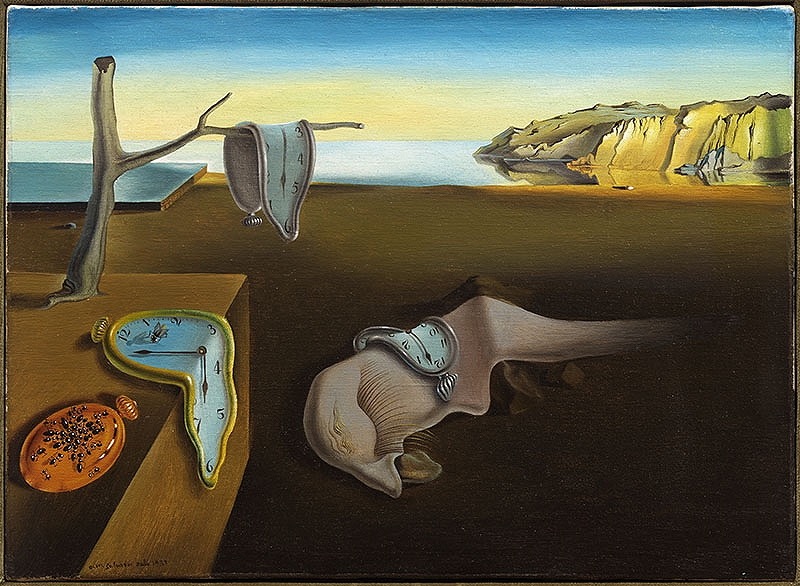Measuremont

La persistance de la mémoire (The Persistence of Memory), Olive Salvador Dali, 1931
"When engaging in timeless anything, expect expectations to prove misleading."
I can never quite remember at first. The Muse and I bought two more cases of fresh tomatoes thinking we'd roast the contents of one and juice the contents of the other, twenty or thirty pounds each case. We'd 'processed' tomatoes many times before, but those experiences produced little more than vague recollections, not immediately accessible in any functional form. The roasting takes time and includes a cumbersome step where I'm supposed to pull the peel off each hot roasting half, just as if that were humanly possible, while scorching my fingertips. How terribly renewing! Juicing involves little more than coring, quartering, and heating, then crushing in the Foley® food mill, an inherently picky and frustrating business. I finally plug into my vestigial muscle memory and set myself to work, slicing, salting, seasoning, and roasting. The recipe says check after twenty minutes. After twenty minutes, the roasting halves seem unaffected. I set the timer for twenty more minutes and settle into finish that novel while I wait. I repeat this cycle twice more before the tomatoes seem in any way peel-able, then painstakingly set about successfully performing the impossible ritual. I'm more than two hours into what started out as a twenty minute expectation by the time I decide that I'm done roasting and it's time to start canning. ©2020 by David A. Schmaltz - all rights reserved
I'd gathered the little jars while the tomatoes roasted, and also set the lids to simmering on the stove top. I'd fetched the mighty pressure cooker and set to work stuffing jars, finishing each off with a blurp of the nectar earlier drained off the roasting tomatoes before tightly sealing each jar and arraying them within the cooker, two tiers this time, with empty jars added to keep the scant second layer in line. The recipe suggested a fourteen minute cook at nine pounds pressure, but at this altitude, one must cook longer and at higher pressure to compensate for the thin atmosphere. I fill the cooker with water, screw down the lid, then wait. I wait until steam starts escaping from the little valve where the weight sits, then I wait ten minutes more while the excess air inside gets pushed out of there. Then I can drop the weight on the valve and wait again until the inside pressure builds to the prescribed level, an additional ten or fifteen minutes. Only then can I begin counting the few short minutes the recipe called for the cooking to last. I add five minutes and excuse myself to read some more. I'd finished that Great American Novel after I'd cleaned up everything from the overlong preparing by the time that fifteen minutes was up.
Once the prescribed cooking time's expended, I turn off the burner and wait again. I wait this time for the cooker to cool enough for me to extract the finished jars so they can thoroughly cool on the sidebar. It will be the better part of another hour before I can accomplish that task. I take a short nap. Finally able to open up the cooker, I remove the jars to a tea towel-draped cooling rack then sit back some more. I'll want to wash the jars before storing, but they'll need to cool to no more than warm to the touch as they're still boiling inside when first removed. I cannot even clean up the cooker then because the cast aluminum remains far too hot to touch and so definitely too hot to wash. More waiting …
When the recipe says twenty minutes, expect to spend some much higher multiple of that time actually completing the chore. If a pressure cooker's involved, it matters little if the prescribed cooking time calls for fifteen or seventy five minutes, for you'll spend much more time loading, steaming up, cooling down, and otherwise dealing with all the externalities associated with actually cooking. Time becomes a meaningless measure of anything. One must simply commit to staying just as long as it takes and long-term memory can never relate to how long it probably took the last time through, yet we still want to know at the very beginning precisely how long each procedure might take. The proper answer might always be "It will most certainly take much longer than you'd ever willingly agree to contribute at the beginning." Twenty minutes will reliably turn into two hours. A planned morning's effort might be almost completed by supper time, but only if suppertime's delayed for an hour or two beyond anything you might have previously grown accustomed to.
Canning's a timeless activity, unmeasurable by mere timepieces. It's measured instead by a budding dedication to simply contributing whatever it ultimately takes. Measured against even generous expectations, it will always turn in disappointing results, over time and budget, but these Measuremonts mean nothing. When engaging in timeless anything, expect expectations to prove misleading. There could be no calibration capable of measuring the quantities invested or the returns ultimately calculated. When feeding some future you, what you have to put yourself through loses most of its present-value meaning. The pristine jars lining that larder shelf will not remember the frustration you invested into creating them or the deep personal satisfaction you experienced when the interminable effort finally ended. The following morning, lovingly washing each jar and scribbling the identifying code on top, the whole inconveniencing process will have been lost in rounding, unaccountable and ultimately unimportant. A day in the life spent apparently wasting a day in the life with something preserved for an unforeseeable future life. The whole effort ultimately becomes unmeasurable, and most properly so.


